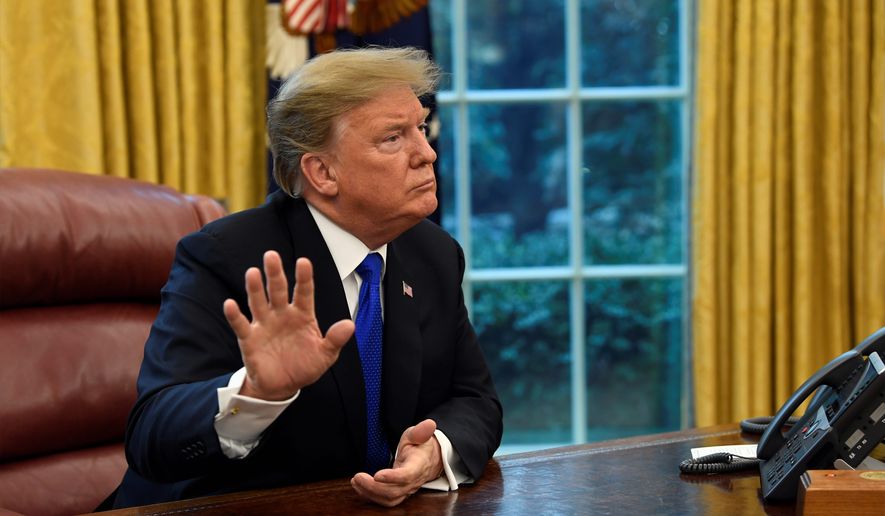President Trump has now reversed his own budget team on two high-profile cuts, leaving budget experts scratching their heads over the disconnect between the chief executive and the blueprint he signed his name to.
Last week, Mr. Trump made waves by publicly disavowing his Education Department’s cuts to the Special Olympics, saying he had only just learned about the proposal to slash federal funding and didn’t agree with it — though the cuts have been in his plans for years.
Then Mr. Trump, while campaigning in Michigan, promised “full funding” for the Great Lakes Restoration Initiative, contradicting his budget’s trims to that program.
“I’ve been racking my head going back even to the Reagan years,” said G. William Hoagland, a senior vice president at the Bipartisan Policy Center. “I can’t think of any situation where within two weeks, I think, of the president submitting a budget that the president or even to that extent the director of the Office of Management and Budget was modifying the budget proposal.”
Mr. Hoagland, who worked in Congress on federal budget issues for decades, the administration certainly should have been prepared for the public blowback to an approximately $17 million cut in support for the Special Olympics.
Robert Bixby, executive director of the Concord Coalition, said no recent past examples of such rapid-fire reversals immediately came to mind.
He said the president’s reversals have created a bizarre situation where he’s touting deficit reductions while undoing some of the very cuts that allowed him to claim he was making headway on fiscal health.
“He gets to claim the budgetary savings and then he gets to claim that he’s restoring the money, which is actually kind of bizarre,” Mr. Bixby said. “He presents it as if, ’I’m going to fund this Great Lakes Project and I’m going to fund the Special Olympics,’ as if he wasn’t the one that took the money away in the first place. That seems to me kind of unique.”
Perhaps the attention caught Mr. Trump off-guard. His past two budgets have been largely ignored by Congress, and this one is likely to be no different.
Yet the president’s apparent lack of familiarity with his own proposals was striking.
Mr. Trump said he had only learned of the Special Olympics cuts Thursday morning — weeks after his budget was submitted. Later that night, in Grand Rapids, Michigan, he contradicted his budget’s plans for a $270 million cut to the Great Lakes program, which funds preservation and cleanup efforts for the Midwestern lakes.
“I am going to get, in honor of my friends, full funding of $300 million for the Great Lakes Restoration Initiative, which you have been trying to get for over 30 years. So, we will get it done,” he said.
The announcement came after several Republican congressmen had lobbied him on the issue in the presidential limo, according to Rep. John Moolenaar, Michigan Republican.
“As a member of the Appropriations Committee, I will do everything I can to make sure the committee follows through on this new commitment from President Trump to fully fund the [initiative] and help protect the Great Lakes for future generations,” Mr. Moolenaar said.
Democrats said it shouldn’t be seen as an accomplishment that Mr. Trump reversed himself on proposed cuts Congress was planning to ignore anyway.
“President Trump and [Education] Secretary [Betsy] DeVos could not take one more day of a bad news cycle and the public shaming on their cruel and outrageous cut to Special Olympics,” said Rep. Mark Pocan, Wisconsin Democrat.
The reversals are also emblematic of just how little presidential budgets matter anymore to actual nuts-and-bolts of governing, said Brian Riedl, a senior fellow at the Manhattan Institute.
Mr. Riedl said presidents occasionally try to put some distance between themselves and certain line items in their budgets amid public pushback, but that they’re the ones who are ultimately in charge.
“When trying to meet the budget cut targets, it’s really easy to have an overzealous analyst hit a political tripwire you have small decisions made at lower staff levels that Cabinet secretaries sign off on quickly without much thought,” he said. “That being said, I would add that the buck stops with the president, obviously and the people that he appoints and trusts to make these decisions.”
• David Sherfinski can be reached at dsherfinski@washingtontimes.com.




Please read our comment policy before commenting.